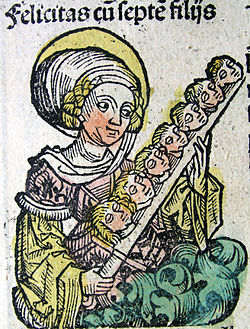 Saint Felicity of Rome, a 2nd-century saint, inspired use of the name Felicity. | |
| Gender | Feminine |
|---|---|
| Origin | |
| Word/name | Latin and English |
| Meaning | "happiness, good luck" |
| Other names | |
| Nickname(s) | Fee, Flick, Flicka, Fliss, Flissa, Flossie, Flossy, Liccy, Liss, Lissa, Lissie, Lissy |
| Related names | Felice, Felicia, Feliciana, Félicie, Félicienne, Felix, Felicitas |
Felicity is a feminine given name of English origin meaning "happiness". It is derived from the Latin word felicitas meaning "luck, good fortune". [1] It is also used as a form of the Latin name Felicitas, taken from the name of the Ancient Roman goddess Fortuna. [2] It was also the name of Saint Felicity of Rome, a 2nd-century saint venerated by the Roman Catholic Church. The Latin Felicia, a related name, is a feminine form of the name Felix, which is derived from an Ancient Roman cognomen meaning "lucky," or "successful." Traditional English diminutives include Fee, Flick, Flicka, Fliss, Flissy, Flossie, Flossy, Liccy, Liss, Lissa, Lissie, and Lissy, among others. [3] [4]